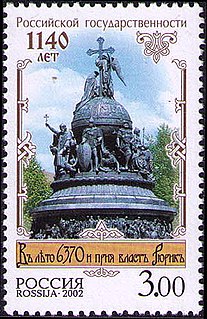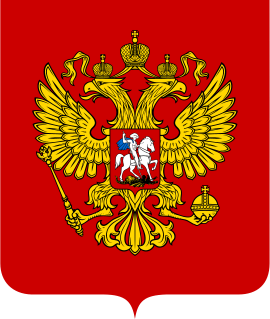
Comparative law is the study of differences and similarities between the law of different countries. More specifically, it involves the study of the different legal "systems" in existence in the world, including the common law, the civil law, socialist law, Canon law, Jewish Law, Islamic law, Hindu law, and Chinese law. It includes the description and analysis of foreign legal systems, even where no explicit comparison is undertaken. The importance of comparative law has increased enormously in the present age of internationalism, economic globalization, and democratization.

The history of Russia begins with that of the East Slavs and the Finno-Ugric peoples. The traditional beginning of Russian history is the establishment of Kievan Rus', the first united Eastern Slavic state, in 882. The state adopted Christianity from the Byzantine Empire in 988, beginning the synthesis of Byzantine and Slavic cultures that defined Orthodox Slavic culture for the next millennium. Kievan Rus' ultimately disintegrated as a state due to the Mongol invasions in 1237–1240 along with the resulting deaths of about half the population of Rus'.
Nationality is a legal relationship between an individual person and a state. Nationality affords the state jurisdiction over the person and affords the person the protection of the state. What these rights and duties are varies from state to state.

Russia, officially the Russian Federation, is a transcontinental country in Eastern Europe and North Asia. At 17,125,200 square kilometres (6,612,100 sq mi), Russia is by far or by a considerable margin the largest country in the world by area, covering more than one-eighth of the Earth's inhabited land area, and the ninth most populous, with about 146.77 million people as of 2019, including Crimea. About 77% of the population live in the western, European part of the country. Russia's capital, Moscow, is one of the largest cities in the world and the second largest city in Europe; other major cities include Saint Petersburg, Novosibirsk, Yekaterinburg and Nizhny Novgorod. Extending across the entirety of Northern Asia and much of Eastern Europe, Russia spans eleven time zones and incorporates a wide range of environments and landforms. From northwest to southeast, Russia shares land borders with Norway, Finland, Estonia, Latvia, Lithuania and Poland, Belarus, Ukraine, Georgia, Azerbaijan, Kazakhstan, China, Mongolia and North Korea. It shares maritime borders with Japan by the Sea of Okhotsk and the U.S. state of Alaska across the Bering Strait. However, Russia recognises two more countries that border it, Abkhazia and South Ossetia, both of which are internationally recognized as parts of Georgia.

Russian is an East Slavic language, which is official in the Russian Federation, Belarus, Kazakhstan and Kyrgyzstan, as well as being widely used throughout Eastern Europe, the Baltic states, the Caucasus and Central Asia. It was the de facto language of the Soviet Union until its dissolution on 25 December 1991. Although, nowadays, nearly three decades after the breakup of the Soviet Union, Russian is used in official capacity or in public life in all the post-Soviet nation-states, as well as in Israel and Mongolia, the rise of state-specific varieties of this language tends to be strongly denied in Russia, in line with the Russian World ideology.

The Soviet Union, officially the Union of Soviet Socialist Republics (USSR), was a socialist state in Eurasia that existed from 1922 to 1991. Nominally a union of multiple national Soviet republics, its government and economy were highly centralized. The country was a one-party state, governed by the Communist Party with Moscow as its capital in its largest republic, the Russian Soviet Federative Socialist Republic. Other major urban centres were Leningrad, Kiev, Minsk, Alma-Ata, and Novosibirsk. It spanned over 10,000 kilometres east to west across 11 time zones, and over 7,200 kilometres north to south. It had five climate zones: tundra, taiga, steppes, desert and mountains.

The Ukrainian Soviet Socialist Republic, also known as the Soviet Ukraine, was one of the constituent republics of the Soviet Union from the Union's inception in 1922 to its breakup in 1991. The republic was governed by the Communist Party of Ukraine as a unitary one-party socialist soviet republic.

The occupation of the Baltic states involved the military occupation of the three Baltic states—Estonia, Latvia and Lithuania—by the Soviet Union under the auspices of the 1939 Molotov–Ribbentrop Pact in June 1940. They were then incorporated into the Soviet Union as constituent republics in August 1940, though most Western powers never recognised their incorporation. On 22 June 1941, Nazi Germany attacked the Soviet Union and within weeks occupied the Baltic territories. In July 1941, the Third Reich incorporated the Baltic territory into its Reichskommissariat Ostland. As a result of the Red Army's Baltic Offensive of 1944, the Soviet Union recaptured most of the Baltic states and trapped the remaining German forces in the Courland pocket until their formal surrender in May 1945. The Soviet "annexation occupation" or occupation sui generis of the Baltic states lasted until August 1991, when the three countries regained their independence.

The primary and fundamental statement of laws in the Russian Federation is the Constitution of the Russian Federation.

The Law of the Soviet Union was the law as it developed in the Soviet Union (USSR) following the October Revolution of 1917. Modified versions of the Soviet legal system operated in many Communist states following the Second World War—including Mongolia, the People's Republic of China, the Warsaw Pact countries of eastern Europe, Cuba and Vietnam.
The Estonian Apostolic Orthodox Church is an autonomous Orthodox church whose primate is confirmed by the Ecumenical Patriarch of Constantinople. Under Estonian law it is the legal successor to the pre–World War II Estonian Orthodox Church, which in 1940 had had over 210,000 faithful, three bishops, 156 parishes, 131 priests, 19 deacons, two monasteries, and a theological seminary; the majority of the faithful were ethnic Estonians. Its official name is Orthodox Church of Estonia.

State continuity of the Baltic states describes the continuity of the Baltic states as legal entities under international law while under Soviet rule and German occupation from 1940 to 1991. The prevailing opinion accepts the Baltic thesis of illegal occupation and the actions of the USSR are regarded as contrary to international law in general and to the bilateral treaties between the USSR and the Baltic states in particular.
Harold J. Berman was an American legal scholar who was an expert in comparative, international and Soviet/Russian law as well as legal history, philosophy of law and the intersection of law and religion. He was a law professor at Harvard Law School and Emory University School of Law for more than sixty years, and held the James Barr Ames Professorship of Law at Harvard before he was appointed as the first Robert W. Woodruff Professor of Law at Emory. He has been described as "one of the great polymaths of American legal education."

Women in Russian society have a rich and varied history during numerous regimes throughout the centuries. It is important to note that since Russia is a multicultural society, the experiences of women in Russia vary significantly across ethnic, racial, religious, and social lines. The life of an ethnic Russian woman can be dramatically different from the life of a Bashkir, Chechen, or Yakuts (Sakha) woman; just as the life of a woman from a lower-class rural family can be different from the life of a woman from an upper-middle-class urban family. Nevertheless, a common historical and political context provides a room for speaking about women in Russia in general.

Citizenship of Russia is regulated by the federal act regarding citizenship of the Russian Federation, Constitution of the Russian Federation, and the international treaties that cover citizenship questions to which the Russian Federation is a party. In accordance with the supremacy clause of the Constitution, international treaties of the Russian Federation have precedence over Russian domestic law.
Feodor Ivanovich Kozhevnikov (1903–1998) was a Soviet legal expert.

The Ministry of Justice of the Russian Federation is the central government body charged with leading the legal and penal system of Russia.












